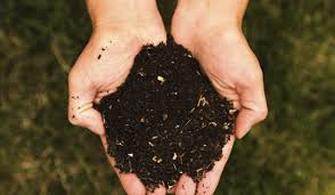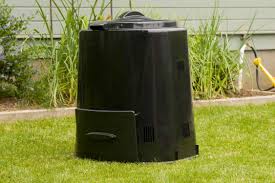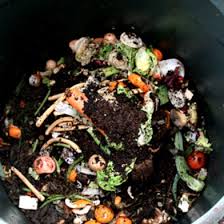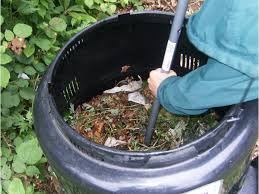COMPOSTING FOR GARDEN HEALTH

Summer is the best time to be composting as your compost pile is working at its peak rate of decomposition, especially if it has been turned once or twice. With enough organic waste, you can produce several batches of highly manageable compost during the summer. However, you can compost at any time of the the year, it just might take a little longer.
Compost serves primarily as a soil conditioner, whether it’s spread in a layer on the soil surface or is dug in. A garden soil regularly enhanced with good compost is better able to hold air and water, drains more efficiently, and contains a nutrient reserve that plants can draw on. The amended soil also tends to produce plants with fewer insect and disease problems. The compost encourages a larger population of beneficial soil microorganisms, which control harmful microorganisms. It also fosters healthy plant growth, and healthy plants are better able to resist pests.
Compost serves primarily as a soil conditioner, whether it’s spread in a layer on the soil surface or is dug in. A garden soil regularly enhanced with good compost is better able to hold air and water, drains more efficiently, and contains a nutrient reserve that plants can draw on. The amended soil also tends to produce plants with fewer insect and disease problems. The compost encourages a larger population of beneficial soil microorganisms, which control harmful microorganisms. It also fosters healthy plant growth, and healthy plants are better able to resist pests.
1. Location
Choose an area in your yard that is well-drained and close to the garden so you can easily transfer the composted soil once it's ready.
Choose an area in your yard that is well-drained and close to the garden so you can easily transfer the composted soil once it's ready.

1. Choosing a style
Composting bins are more suitable for smaller gardens whereas a simple pit can be all that’s required if you live on a large property. Composting piles can be made directly on the ground with some wood as a frame simple. Determine what the best style is for your yard and how much green waste you produce.
Composting bins are more suitable for smaller gardens whereas a simple pit can be all that’s required if you live on a large property. Composting piles can be made directly on the ground with some wood as a frame simple. Determine what the best style is for your yard and how much green waste you produce.

3. Making compost
Gather all the organic materials you can find in your garden such as grass clippings, leaves and weeds and add them to your pit or bin. Include any organic food scraps from the kitchen that will break down as well. Don’t go overboard on onion skins as worms don’t like them and weeds that spread by runners such as oxalis or couch grass. If you want to kick-start the composting process, add a few shovels of soil rich in decomposing organisms.
4. Maintaining the compost
This is the most important part of the process and will determine the quality of your compost. Keep monitoring moisture levels and air intake as these factors are both vital for effective decomposing. If the compost becomes saturated it can emit foul odours. If this happens, punch holes in the side of the pile for aeration.
Gather all the organic materials you can find in your garden such as grass clippings, leaves and weeds and add them to your pit or bin. Include any organic food scraps from the kitchen that will break down as well. Don’t go overboard on onion skins as worms don’t like them and weeds that spread by runners such as oxalis or couch grass. If you want to kick-start the composting process, add a few shovels of soil rich in decomposing organisms.
4. Maintaining the compost
This is the most important part of the process and will determine the quality of your compost. Keep monitoring moisture levels and air intake as these factors are both vital for effective decomposing. If the compost becomes saturated it can emit foul odours. If this happens, punch holes in the side of the pile for aeration.

5. Turning
As funghi and bacteria grow and eat the waste, the compost will fluctuate in heat. Once the pile becomes uncomfortable to touch then it’s time to turn it with a pitch fork and shovel. NB: turning your pile every second day should produce compost in less than one month. If you turn it every other week expect to wait between one to three months until it’s ready.
As funghi and bacteria grow and eat the waste, the compost will fluctuate in heat. Once the pile becomes uncomfortable to touch then it’s time to turn it with a pitch fork and shovel. NB: turning your pile every second day should produce compost in less than one month. If you turn it every other week expect to wait between one to three months until it’s ready.
6. Compost soil
Finished compost won’t produce any heat, smells sweet and will be cool and crumbly to touch. Once you’ve reached this point it’s time to start putting it to good use in the garden while you start on your next pile!
Finished compost won’t produce any heat, smells sweet and will be cool and crumbly to touch. Once you’ve reached this point it’s time to start putting it to good use in the garden while you start on your next pile!
